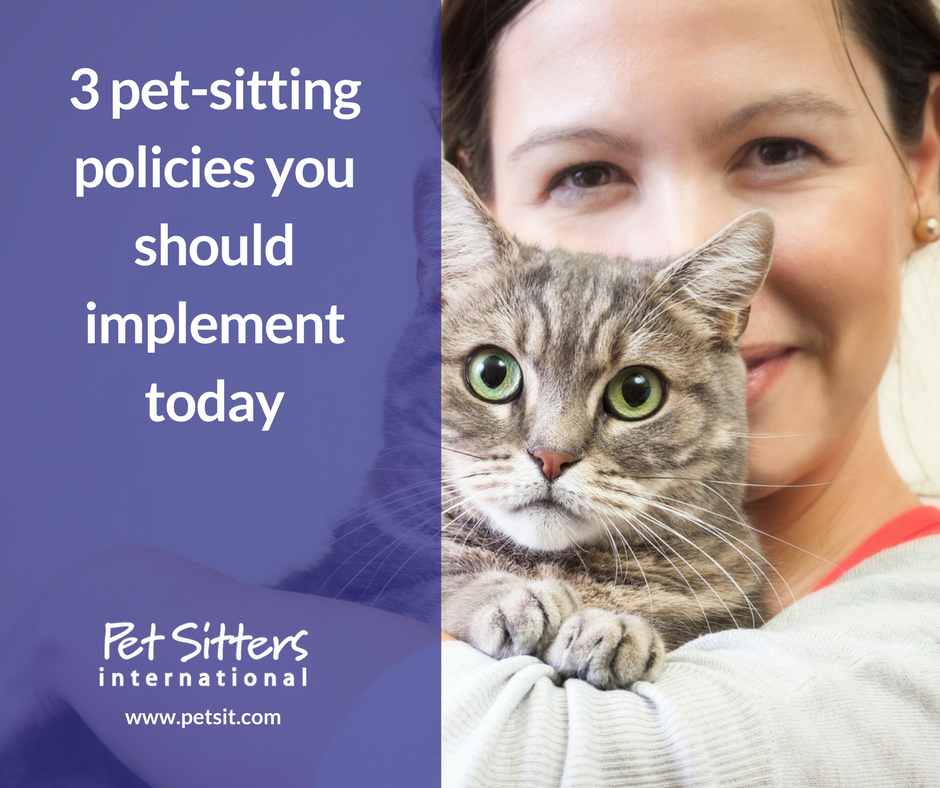3 pet-sitting policies you should implement today
When you started your pet-sitting business, you likely implemented your basic policies and had a clear idea of the services you would offer, the areas you would service and even the types of payment you would accept from clients.
But, depending on your location, the services you offer and the experiences you have with your clients, you may find the need for additional policies and procedures for your pet-sitting business as your career progresses.
Depending on your business needs, there are a variety of policies you may choose to incorporate into your business model.

Here are three policies we encourage your pet-sitting business to consider adopting (if you haven’t already):
No every other day visits
One common policy that many pet sitters have adopted and share with clients is the “no every other day visits for cats” policy.
Picture this: You arrive at a home to check on a cat for a family whom you’ve been providing cat-sitting services while they are away on a two-week vacation. It’s Monday and the cat was timid, yet playful when you last checked on her on Saturday. Today when you enter the home, however, you find the cat unresponsive and lying in puddles of vomit. You scoop up the cat and race to the nearest emergency vet, while trying to reach the owners on their overseas trip.
After a quick examination, the veterinarian determines this cat had developed a urethral blockage and was unable to urinate. With this condition, her bladder had quickly become distended and kidney toxins were poisoning her blood stream. Once the blockage is relieved and intravenous fluids are given, the cat is expected to make a full recovery—but the chance for survival would have been virtually nonexistent had you arrived at the home even an hour or two later.
While relieved, the pet owners have learned a valuable lesson—anything can happen when a pet is left alone. As a pet sitter you’ve also learned a valuable lesson: Don’t let pet owners “bully” or persuade you into making exceptions to your policies regarding every day visits. Any type of pet-care arrangements, including the frequency of visits, should be included in your pet-sitting service contract and signed by the client. Because, remember, if something goes wrong, who do you think the owner will blame?
Anything can happen when pets are left alone—and cats are no exception. From potentially lethal ailments like the urethral blockage to potential home damages from a cat accidentally loosening a water hose behind a washing machine, not checking on a cat daily while the owner is away can have costly—or tragic—consequences for your business.
No “ignoring the cat” or similar requests
In addition to clients who request every other day visits for cats, you may also receive what we call “ignore the cat” requests. These are clients who want to secure pet-sitting services for their dogs while they are away, but when you arrive for the meet and greet you find that they also have a cat that they say doesn’t need any care or can be ignored. This may also occur in multi-pet households with clients who have birds they say you can ignore (or “just empty the bird feeder”) in addition to other pets.
You can simply explain to pet owners that as a pet-care professional, you cannot, in good conscience, ignore additional pets in the household needing care—and that you will need to provide and be compensated for the care of these additional pets.
No “set in stone” times for pet-sitting visits:
Naturally, you want to accommodate the specific requests of your pet-sitting clients. However, an easy trap some pet sitters unintentionally fall into is setting specific times for pet-sitting visits. You will encounter clients who insist that their dogs must be walked at 7:15 a.m. each morning or their cats need to eat at 6:45 p.m. each evening. Instead, confirm a time range and indicate it on your pet-sitting contract. For example, morning visits may take place between 6 a.m. and 8 a.m. or midday visits will take place between 11 a.m. and 1 p.m. Barring medical conditions that necessitate a specific visit time, most pets will be perfectly fine when visited within a time range, versus a specified time.
Guaranteeing only a time range allows flexibility in your schedule. What if you weren’t able to take on a new client who did need a specific visit time because you already had a client you had promised a specific time, even though it wasn’t necessary? Remember, also, that life happens. You may encounter traffics jams or unexpected events at home that can delay you slightly, and having this flexible visit schedule allows you to still meet your clients’ expectations, as outlined in your pet-sitting agreement.
Another pet-sitting policy to consider
Many pet sitters have also adopted a “no shared visits” policy. You may find that some clients (either in an attempt to save money or simply because they want their pets to have additional care or companionship) ask you to share visits with one of their family members or friends. While some pet sitters have found this type of arrangement to work for their business, many have experienced the downside of sharing a pet-sitting assignment—the friend or family member did not adhere to the client’s directions, left pets out of crates, were at the home when the pet sitter arrived, etc.
If anything goes wrong—regardless of if the friend or family member is at fault—it’s likely that you—the professional pet sitter—may get blamed. Because of this, many pet sitters simply tell clients that they do not share visits or, if they do, they have clients sign a waiver that indicates the pet sitter is not responsible for any damage that may occur to the pet or home since others have access to the home and pets.
Are there any other policies you’ve had to add since you started your pet-sitting business? Share in the comments below.







Comments
Joey Buchan
Karen
McElroy Pet Care
Gail Pasquale
Brooks Pet Sitters
Kathy kultys
And always have an emegency # to call...in case there is any kind of emergency with there home!!
Kathy kultys
And always have an emegency # to call...in case there is any kind of emergency with there home!!
Gail Phillips
Nikki Timberlake
Blood glucose monitoring system
Thanks
Lori Carson
Murray Spackman